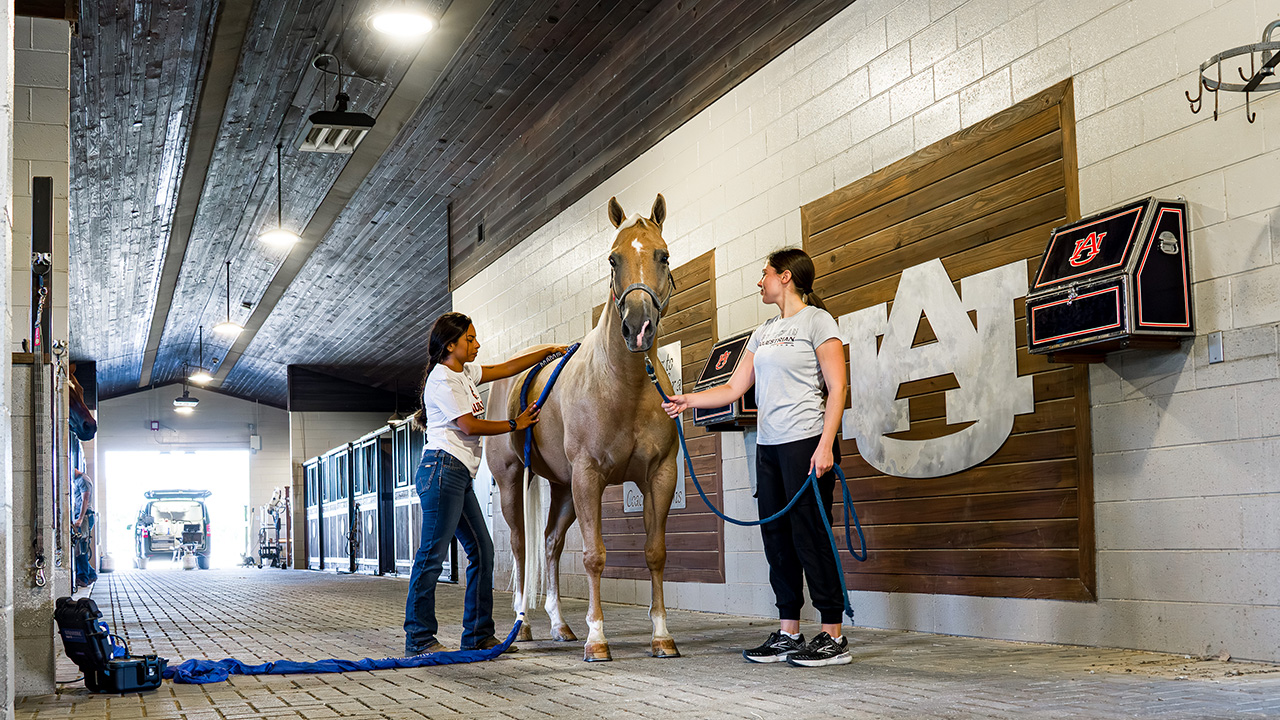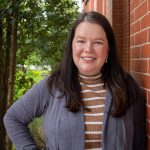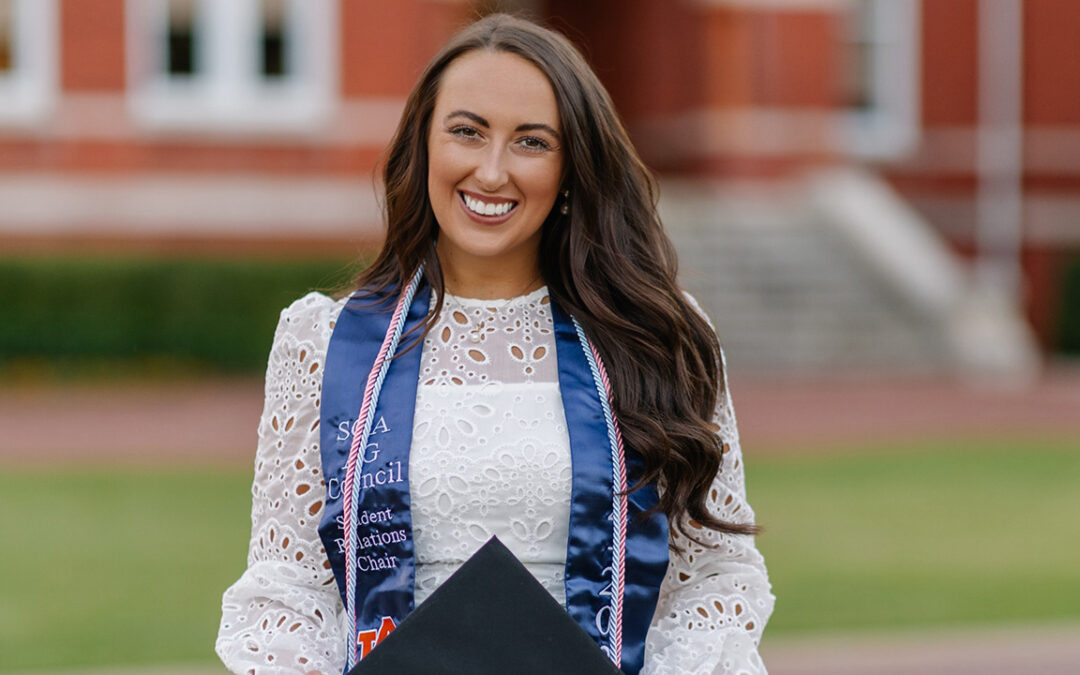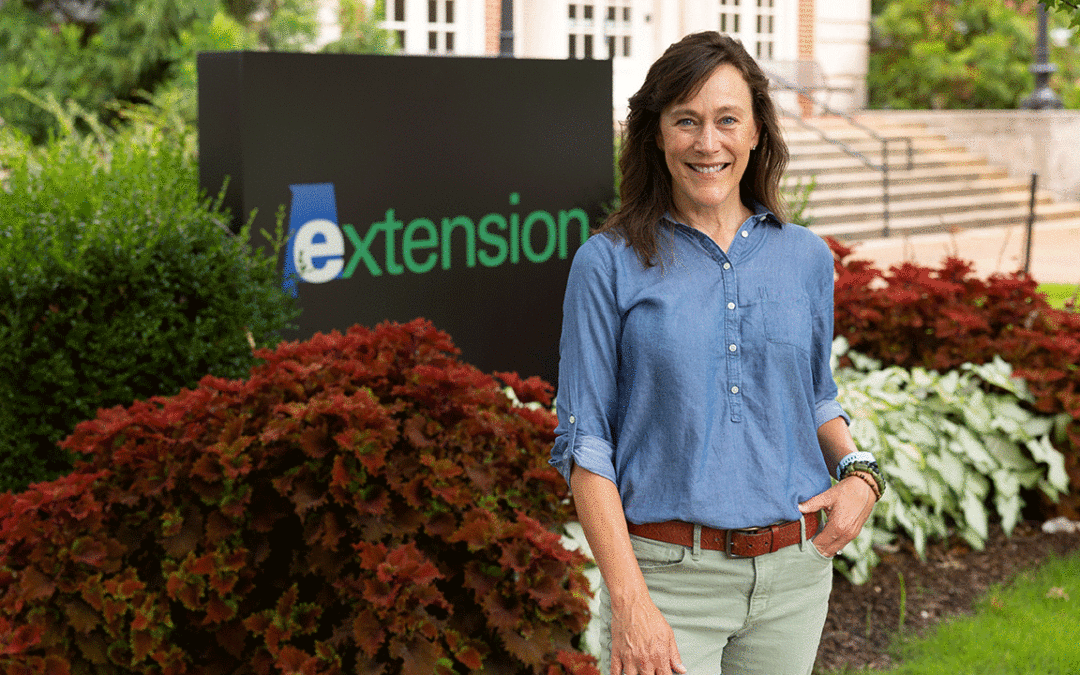At Auburn University, students are taught to meet a practical world with hard work, knowledge to work wisely, and minds and hands trained to work skillfully.
Few places embody this charge outlined in the Auburn Creed more vividly than the Auburn University Equestrian Center, where students work with the technical experience of a laboratory and the high-stakes intensity of a Division I playing field.
“We’re uniquely situated with athletics and academics,” said Head Coach of the NCAA Auburn Equestrian Team Jessica Braswell. “With our partnership with the Department of Animal Sciences and College of Agriculture, we are able to provide a unique opportunity. We’ve got the horses, the staffing and our coaches — it’s a high-performance environment from the athletic standpoint that can give these kids an experience that they wouldn’t have otherwise.
“It is such a good teaching environment, but it also has to be a high-performance environment. We’ve got to keep the horses going. We’ve got to make sure they’re ready for practice and for meets. That’s really hard to get in a true lab setting.”
A strong foundation
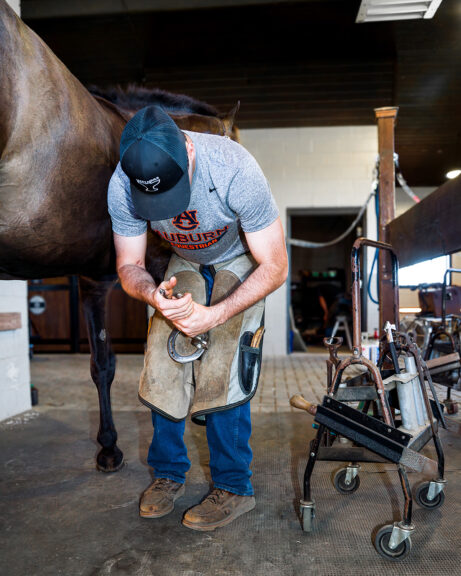 Interns at the Equestrian Center care for horses in the Williams Family Barn, a climate-controlled show barn with 20 stalls, 24 grooming stalls, two tack rooms, 10 wash racks, a veterinarian and farrier area, and more. They are supervised by Equestrian Center Manager Katie Renfroe.
Interns at the Equestrian Center care for horses in the Williams Family Barn, a climate-controlled show barn with 20 stalls, 24 grooming stalls, two tack rooms, 10 wash racks, a veterinarian and farrier area, and more. They are supervised by Equestrian Center Manager Katie Renfroe.
“She’s done a really good job of tailoring the work to where their interests lie,” Braswell said. “If they want to go pre-vet or barn management or another direction — and we’ve had them go all different directions.”
Nick Williams started working in the barn in January 2022. Williams didn’t grow up with horses, but he needed experience with animals and a job as a pre-vet student. He started as a barn hand, cleaning stalls and feeding and medicating horses. He then moved into an equine intern position, caring for horses that were sick or injured, while also helping to keep the performance horses in top condition.
“As part of that role, I assisted with daily therapy routines to support the horses’ health and performance,” he said. “This included using Magnawave, cold laser, Theraplate, BEMER, and massage gun treatments on non-meet days and as preparation leading up to competitions.”
While working in the barn, he noticed a man who would come weekly to shoe the horses.
“At the time, I didn’t know what a farrier was, but watching him work immediately caught my interest,” he said. “One day I saw that he was missing his helper, so I asked if he needed a hand. He let me help, and the next week I started working with him regularly.
“From that point on, I completely fell in love with the trade.”
Williams graduated in May with a degree in animal sciences- allied industries and is headed to Five Star Horseshoeing School in Minco, Oklahoma, in October.
“For the past three years, I’ve been apprenticing under (Certified Farrier) Andrew Wells, which has given me a strong foundation and confirmed that this is the career I want to pursue.”
He credited the Equestrian Center with not only introducing him to the trade he’s become so passionate about, but with the determination needed for animal care.
“It showed me that not everyone is meant for this job,” he said. “That it takes hard work and dedication, long hours, and grit.”
Growing in the field
Williams’ colleague Tia Coker was a junior wildlife science major in 2023 when she started working in the barn. Now a senior animal sciences major, she was introduced to the College of Agriculture by Renfroe.
“I always knew I wanted to work with animals, but I didn’t really have anybody telling me how to do that,” said Coker, who rode horses as a child. “I had a friend that worked in the barn, and she said that they were hiring. So, I started as a student worker, and realized how much I loved it and how much I wanted to do that for the rest of my life.”
When Coker moved into the internship role in the barn, she took on new duties in addition to those she had as a student-worker, including training new hires and working on meet days to care for the horses.
“They learn a thing or two about working with horses,” Braswell joked. “You know, do I want to be up at 6 a.m. doing this? Do I want to be in the heat? Because you do have to love it.”
Coker agreed.
“To normal people, I describe my job like, ‘I get there at 6 a.m. and I leave covered in mud and dirt,’” she said. “And they’re like, ‘Why do you enjoy doing that?’
“I never get sick of it. Ever.”
When Coker switched to the animal sciences major, she understood that securing internships was an important part of gaining relevant work experience. She applied for several internships outside of Auburn, securing one at Peterson Smith Equine Hospital in Ocala, Florida.
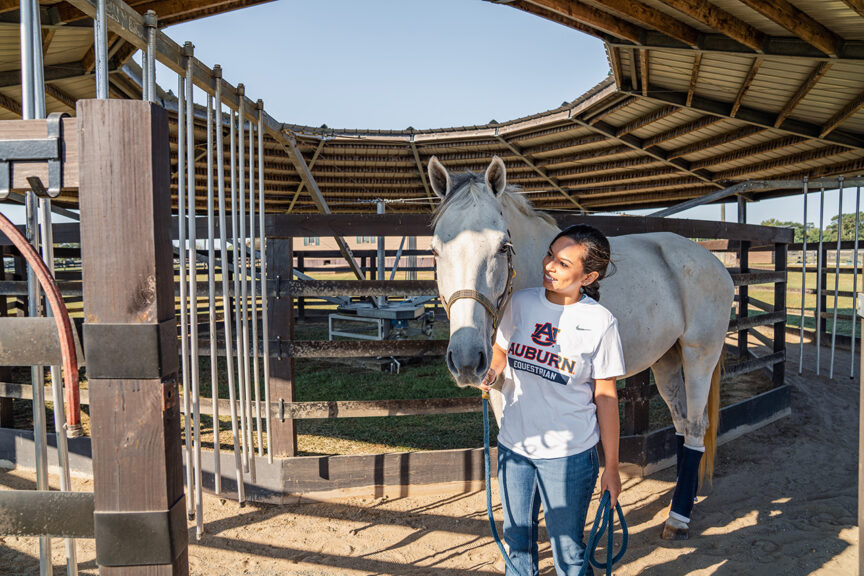 At Peterson-Smith — an equine hospital open 24 hours a day, seven day a week — Coker worked 60 hours a week, day shifts and night shifts. She gained increase experience in equine care, including watching surgeries and administering treatments.
At Peterson-Smith — an equine hospital open 24 hours a day, seven day a week — Coker worked 60 hours a week, day shifts and night shifts. She gained increase experience in equine care, including watching surgeries and administering treatments.
The experience was so formative, her plan after graduation is to move back to Ocala, where horse farms and equine hospitals are popular and the opportunities in the industry are numerous.
Coker credits Renfroe with helping her gain the necessary experience to be career ready, beyond her duties as Coker’s supervisor.
“She encouraged me through the Peterson Smith process, changing my major, everything,” Coker said. “And we know that she would never ask anybody who works for her to do something that she wouldn’t do herself. This work can seem unnecessary or monotonous sometimes, but we know there is always a reason for what she’s asking us to do.”
The only thing Coker would change about her time working in the barn?
“I wish I’d started it sooner,” she said. “If I had known that this job existed when I first got to Auburn — because I worked my first three years here, too, doing other things — I would have loved it that much longer. And I think I would have gotten a lot farther, a lot quicker.”
Accessing hands-on learning
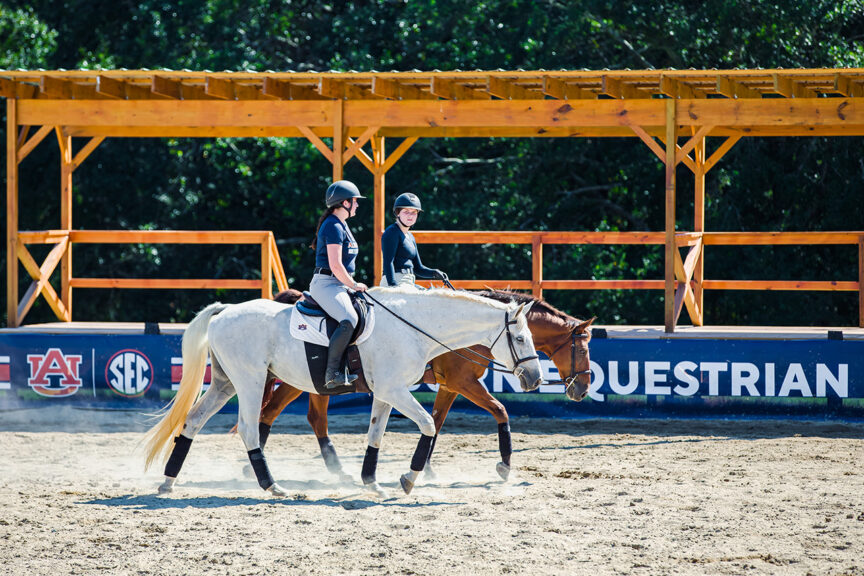 Fellow intern Eliza White is an equestrian on the Auburn IHSA club team, so she was familiar with the barn from her freshman year. Like Coker, her time in the barn prepared her for another formative internship experience.
Fellow intern Eliza White is an equestrian on the Auburn IHSA club team, so she was familiar with the barn from her freshman year. Like Coker, her time in the barn prepared her for another formative internship experience.
“The past two summers, I have gone to Hagyard Equine Medical Institute, which is the oldest equine hospital in the country,” she said. “The first summer I was in their internal medicine department, and then this past summer I was in the surgical department. Basically, we do all of the care for the horses that isn’t done by the doctor — the horse nurse, essentially.”
White and her fellow interns would administer medications and day-to-day treatments, as well as assist in the surgical department, prepping the horses for anesthesia.
Now, she has her sights on veterinary school, with a specific interest in reproductive sciences.
“I have always been really interested in science and the medical field, and I’m also just a really big animal person,” she explained. “And what I learned about Auburn’s animal science program specifically is that the way they teach is very hands-on here.”
Hands-on, high-impact student experiences are a high priority for the Department of Animal Sciences, according to Undergrad Program Officer Carolyn Huntington.
“Whether it is specifically internships or, more broadly, high-impact experiences, it is about connecting classroom knowledge and research knowledge to practical applications,” Huntington said. “While they’re getting those high-impact experiences, they’re expanding and building their network and becoming more prepared for the career field that they hope to pursue.”
These paid internships at the Equestrian Center are made possible by donor Linda Hardy, wife of the late Professor Emeritus William E. “Bill” Hardy Jr., a faculty member in the Department of Agricultural Economics & Rural Sociology at Auburn University for almost 39 years.
“We wanted to just start a way to get kids more hands-on experience with the horses,” said Braswell. “And the idea of doing so through an internship resonated with one of our supporters, Linda Hardy.”
Braswell is a 2009 graduate from the Department of Agricultural Economics & Rural Sociology. Her advisor when she was a student in the department?
Bill Hardy.
“He was always so invested in students and experiences in Auburn and the College of Ag,” Braswell said. “I think it’s been a really cool thing that it’s in his honor, and through his legacy, he is still affecting these students in the college and still helping these students learn and gain experience.
“It really feels very full circle, this opportunity to honor Bill Hardy, to give this experience to students in the Department of Animal Sciences, and to receive their support in athletics. The way it has all evolved is pretty special.”

